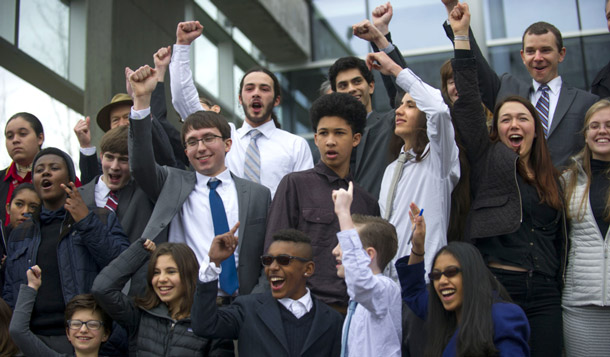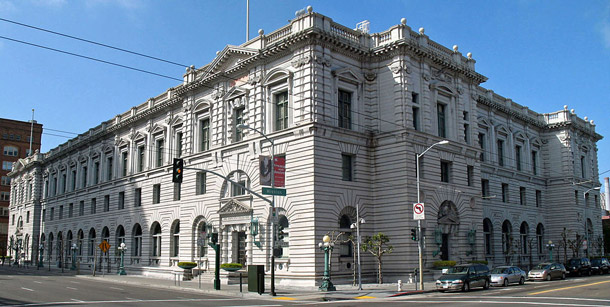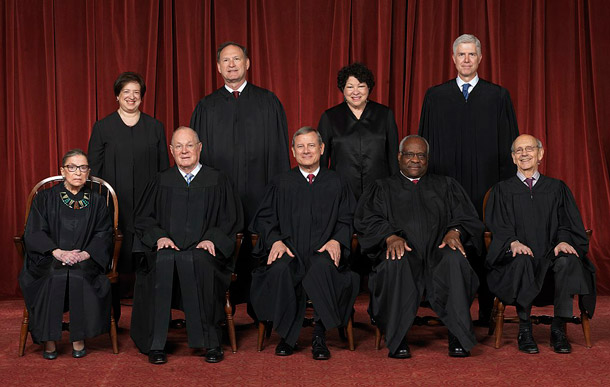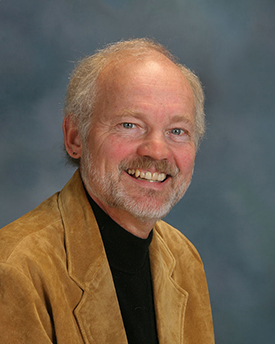Feds Move to Dismiss Youth Climate Suit
Air Date: Week of December 8, 2017

The 21 youth plaintiffs in the Juliana et al. v. United States case. (Photo: Our Children’s Trust)
A group of 21 youths is suing the US government for its failure to protect their future by preventing harmful global warming impacts. But the Trump administration says the case should be dismissed. Oral arguments before the 9th Circuit Court of Appeals on December 11th will help its judges decide whether the case should move ahead to trial. Vermont Law School Professor Pat Parenteau takes host Steve Curwood through the arguments on both sides, and what could happen next.
Transcript
CURWOOD: It’s Living on Earth, I’m Steve Curwood.
In May of 2016, during the Obama-era, a group of young people aged 9 to 21 filed a groundbreaking lawsuit in Oregon Federal court, alleging the failure of the US government to act on global warming violates the constitutional rights of young people to life, liberty, and property. The Trump Administration is now trying to block the suit, with a petition to the Ninth Circuit Court of Appeals on whether the case known as Juliana et al v. United States can proceed to trial. Oral arguments are set for Monday, December 11th, which just so happens to be the twentieth anniversary of the Kyoto Protocol, which, as Peter Dykstra reminded us, the US failed to ratify.
We turn now to Vermont Law School professor Pat Parenteau. Pat, it’s great to have you back.
PARENTEAU: Nice to talk to you, Steve.
CURWOOD: So, Pat, why is it necessary to go through this decision by the Ninth Circuit Court before this case can proceed to trial?
PARENTEAU: It's what's called a mandamus action, and what it means is that the circuit court is being asked by the Trump and administration to basically dismiss the children's lawsuit before it even goes to trial, and this is a very extraordinary remedy, very rarely granted, and so it was unusual that the court decided not only to have brief on this but to hold an oral argument. So, we're all holding our breath to see what the court does.
CURWOOD: You're saying this is unusual. What would motivate the Trump administration to take this extraordinary step?
PARENTEAU: Their argument basically is this is diverting us from more important work that we need to be doing. The Justice Department under Trump has made a bunch of arguments that the discovery process would require witnesses as high as Cabinet officers such as Rex Tillerson - who of course was a former CEO of Exxon - to have to appear for a deposition under oath and answer very probing and probably uncomfortable questions. So, that would be sort of commandeering some of the senior officials of the administration and diverting them from their more important tasks, like dealing with North Korea or whatever. Those are the kinds of arguments, Steve, that the Trump administration is actually making in court and that we're going to hear at the oral argument that's coming up on December 11.
CURWOOD: And. wait a second. What you said sounds outrageous, Pat, that they're saying, well we're just too busy we're were annoyed that we might have to address this climate thing, and so, please, Ninth Circuit Court of Appeals make this non-consequential thing go away.
PARENTEAU: Right, and Scott Pruitt, the EPA administrator has questioned whether a carbon dioxide is a major force that's causing climate change. He's going to be called to task on that. He's going to be asked, “On what basis do you make a claim like that, and are you saying that you're not going to use the authorities you have under the Clean Air Act to address carbon pollution?” Those are the some of the questions that a trial would get at.
CURWOOD: So, what exactly is the risk the Trump administration runs if this case goes to trial? And should a judge then find for the plaintiffs, the kids, who say that the government's not doing enough to deal with climate disruption?

The Ninth Circuit Court of Appeals is headquartered in the James R. Browning United States Court of Appeals Building in San Francisco, California. (Photo: Sanfranman59, Wikimedia Commons)
PARENTEAU: Oh this would be a monumental decision. I mean, we've seen decisions like this in other countries. The most significant one is the Urgenda case in the Netherlands where the Netherlands court did say that the government of the Netherlands had a constitutional duty to do more to address climate change. Of course, this administration is doing nothing. In the Netherlands, they are doing quite a bit, but the court in the Netherlands said, “You, government, your primary mission is to protect the safety of the people not only of the Netherlands but of global populations.”
So, a decision in the United States that came anywhere close to that, that said there's a constitutional duty on the part of the federal government to stop withdrawing from international agreements like we've done, to stop repealing laws like the Clean Power Plan that would clean up our energy sector, and all down the line, that would be probably one of the most precedential decisions we've ever seen in the United States.
CURWOOD: So, move over Brown v. Board of Education. Move over Plessey v. Ferguson. Put this one in the history books.
PARENTEAU: We're in that zone. We're in that revolutionary courts changing the course of history zone. That's right.
CURWOOD: Now, how would you characterize the judges on this Ninth Circuit Court of Appeals that are going to hear whether or not this case should go to trial? What inkling, if any, do you have of how sympathetic they might be to the Trump administration's attempts to stop this case from going to trial?
PARENTEAU: Oh boy, well, it's a real mixed bag. This is a three judge panel of the Ninth Circuit. One of the judges is Judge Kozinski. He's one of the most conservative jurists in the country. He takes some pretty extreme positions on issues like the jurisdiction of the courts limiting the access of citizens to courts, deferring to the status quo and to business interests. So, Judge Kozinski is almost certainly a vote against this case proceeding. Then we have Judge Goodwin. He's known as, as a moderate judge who has written some good environmental opinions. He's not necessarily pro environment, per se, but he's a gettable vote I would say for the plaintiffs in this case. And then there's Judge Berzon who is actually one of the more active and even aggressive questioners at oral argument. She's known for her very sharp questioning of all the lawyers, and so she's a bit unpredictable.
This is a case where the oral argument actually might make a very big difference in the outcome of the case. Usually these cases are pretty well decided once all the briefs have been filed, and the judges have had their clerks doing research. The fact that they have actually scheduled oral argument I think means the decision is up in the air, and it's up for grabs.

Depending on the outcome of the Ninth Circuit Court’s review of Juliana et al. v. United States, either the plaintiffs or defendants could appeal the decision up to the Supreme Court of the United States. (Photo: Franz Jantzen, CC Government Domain)
CURWOOD: What kinds of questions do you expect the judges to ask at the oral arguments? I'm guessing that they are asking questions to settle their own internal discussion. The points have been made, and they want each side to clarify those points.
PARENTEAU: Yes, that's true, and they've looked at the briefs and they've seen the arguments going past one another, and they're going to try to connect up where is the real crux of the argument at, in this case. There are lots of really tough legal questions. For example, the standing of the youth plaintiffs. How exactly are they harmed by the failure of the government to address climate change that's different from everybody else because, of course, climate change is a global problem. It affects everybody. The youth are arguing, “Yeah, but it affects us differently because you're making decisions that we're not going to be able to undo. You're basically committing us to a fate that we do not have any control over.” That's a pretty compelling argument, at least to me.
Another question obviously is, why not go to trial? What really is the burden on the government? And here I think the panel is going to be zeroing in on the Trump administration lawyers and asking them some pretty sharp questions about why is this such an impossible burden for you to bear. If we go to trial, and you're right that neither the law nor the evidence supports the plaintiff's case, then there can be an appeal, and we can deal with the merits of the case at that time. Why should we step in now and stop the case cold in its tracks? Those are the kinds of questions that I think the government are going to be asked.
CURWOOD: Shortly after this suit was originally filed, the country's most powerful fossil fuel lobbies joined the government's side of the case. I think it was two years ago, but not so long ago, I think in May, they abruptly withdrew. What do you make of this decision?
PARENTEAU: Well, two things. One they're relying on the Trump administration to "carry their water". And, number two I think they were worried about the discovery process, and they were worried that they, as parties to the case would be subject to the same kinds of rules of depositions, having to testify under oath, having to answer a lot of fairly detailed questions about what did you know, when did you know it. What is all of this evidence that shows that you had your own experts telling you decades ago that fossil fuel development and burning of fossil fuels and carbon dioxide pollution was causing climate change? You knew that. You misled the public about that. You funded efforts to distract the public and the government from dealing with that. This is all now these documents have become a matter of public record, and the witnesses and the corporate managers for the fossil fuel industries would have been asked questions under oath about all of that.
CURWOOD: Now that the fossil fuel industry is out of this case, what does it mean for how it might play out?
PARENTEAU: Well, the judge that's overseeing the case, Judge Aiken in Oregon, and the Magistrate Judge Kaufman, who is kind of the, the master of ceremonies, if you will, that's managing the case, both of them have written to the Ninth Circuit panel. The panel asked for their views of how the case was going to be handled, and both the judge and the Magistrate have reassured the Ninth Circuit that with the exit of the industry interveners, the case is much simpler, much more manageable. They've also reassure the Ninth Circuit that they're not going to allow the plantiffs free reign in terms of discovery. They've already issued some orders that are narrowing some of the discovery requests the plaintiffs have.

Pat Parenteau is an environmental law expert and a professor at the Vermont Law School. (Photo: Vermont Law School)
CURWOOD: So, the oral arguments on December 11th. When might we expect a decision from the Ninth Circuit Court of Appeals? At least these three judges?
PARENTEAU: The trial is scheduled to start in February. That's probably not going to happen under any circumstance, but I think it does indicate that the panel will try very hard to issue a decision before the end of the year, and I guess you'd have to say let's hope it's not a lump of coal in the sock of the kids in this case.
CURWOOD: So, when the Circuit Court of Appeals decides this, let's say that it goes in favor of the plaintiffs. What further option of appeal would the federal government have?
PARENTEAU: They could always ask the Supreme Court to step in. This statute that the government is relying on, which is called the All Writs Act, a very old statute, does give the Supreme Court the power to step into a case and say, “You know what? We're going to rule that federal courts have no jurisdiction over claims like this.” It only takes four votes on the Supreme Court to decide to hear such a petition, so it's not beyond the realm of possibility that a decision to allow the case to go forward would be reviewed by the Supreme Court. Again, we're in uncharted waters, I guess you'd have to say on this one, and it's very hard to predict what the future might be.
CURWOOD: I imagine if the plaintiffs, if the young folks lose, they would likely also seek an appeal?
PARENTEAU: Yes, they would, and on that score, I think it would be very hard. If you look at the lineup of the court, and if you look at the recent appointment of Justice Gorsuch, it is very hard to see five votes in favor of the case at this stage. There could be four votes to hear an appeal by the kids if they lose, but those four justices are going to have to look at the reality that they probably aren't going to be able to persuade one more justice on the court, who would probably have to be Justice Kennedy, to proceed.
Justice Kennedy is of course the swing vote and he can be unpredictable, and he has been the champion of constitutional rights, of course, that we've never seen before, like the right to marry the person of your choice. So, it's not beyond the realm of possibility that Justice Kennedy might say, “Let's allow a case like this to go to trial and see what a trial produces”. I think it's unlikely, though, that that would be the vote.
CURWOOD: So, let's say that the kids are turned down, and the Supreme Court at this point won't take a listen. What option would there be for someone else to try to file an action like this, and from your perspective what are the weaknesses of the kids’ cases that might be rectified with a new filing?
PARENTEAU: A filing that was more focused on the impacts of climate change on the oceans, which are clearly federal jurisdiction, ocean acidification which is a big problem. The warming of the oceans and the bleaching of the coral reefs is a huge problem. And I could see a case that was more narrowly tailored brought by fisherman, for example, saying, “Look, we're losing our oyster farms in the Pacific Northwest - which they are - and the lobstermen in Maine saying, “Our lobsters are moving north in response to the warming of the Gulf of Maine.” I could actually see a case like that maybe having more chance of success. It's a narrower case, more tailored to a classic federal responsibility over ocean and coastal water. So, those are cases that I'm sure a lot of lawyers are looking at and thinking about, and we may see one of those cases before long.
CURWOOD: Pat Parenteau is a Professor of Environmental Law at Vermont Law School. Thanks so much for taking the time with us today, Professor.
PARENTEAU: Good to be with you, Steve.
CURWOOD: We asked the Justice Department for comment but they declined.
Links
InsideClimate News: “Appeals Court Takes Up Youth Climate Change Lawsuit Against Trump”
Juliana v. U.S. -- Climate Lawsuit from Our Children’s Trust
The letter from Judges Ann Aiken and Thomas Coffin to the 9th Circuit Court
Living on Earth wants to hear from you!
Living on Earth
62 Calef Highway, Suite 212
Lee, NH 03861
Telephone: 617-287-4121
E-mail: comments@loe.org
Newsletter [Click here]
Donate to Living on Earth!
Living on Earth is an independent media program and relies entirely on contributions from listeners and institutions supporting public service. Please donate now to preserve an independent environmental voice.
NewsletterLiving on Earth offers a weekly delivery of the show's rundown to your mailbox. Sign up for our newsletter today!
 Sailors For The Sea: Be the change you want to sea.
Sailors For The Sea: Be the change you want to sea.
 The Grantham Foundation for the Protection of the Environment: Committed to protecting and improving the health of the global environment.
The Grantham Foundation for the Protection of the Environment: Committed to protecting and improving the health of the global environment.
 Contribute to Living on Earth and receive, as our gift to you, an archival print of one of Mark Seth Lender's extraordinary wildlife photographs. Follow the link to see Mark's current collection of photographs.
Contribute to Living on Earth and receive, as our gift to you, an archival print of one of Mark Seth Lender's extraordinary wildlife photographs. Follow the link to see Mark's current collection of photographs.
 Buy a signed copy of Mark Seth Lender's book Smeagull the Seagull & support Living on Earth
Buy a signed copy of Mark Seth Lender's book Smeagull the Seagull & support Living on Earth

